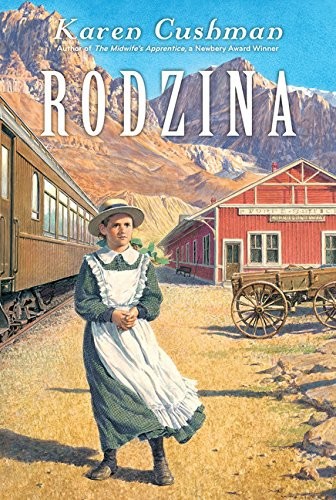
Rodzina
فرمت کتاب
ebook
تاریخ انتشار
2003
Lexile Score
740
Reading Level
3-4
ATOS
4.8
Interest Level
4-8(MG)
نویسنده
Karen Cushmanناشر
HMH Booksشابک
9780547533483
کتاب های مرتبط
- اطلاعات
- نقد و بررسی
- دیدگاه کاربران
نقد و بررسی

January 13, 2003
After taking on medieval times in Catherine Called Birdy
and Matilda Bone, Cushman here follows another feisty heroine as she makes her way West on an orphan train. Narrator Rodzina Cara Jadwiga Anastazya Brodski (who is "big for twelve and every day getting bigger"), starts out with 22 other orphaned children in Chicago, and the novel ends as her train pulls into Oakland Station in California. The author packs a lot into the intervening chapters, often at the expense of character development. A few of Rodzina's fellow riders stand out, such as pretty (but "slow") Lacey, who attaches herself to Rodzina, and Mickey Dooley, who introduces himself as "Orphan, purveyor of blarney, and a genuine bag of laughs." Although many of the train stops are a blur, a memorable scene takes place in a dugout east of Cheyenne, where Rodzina briefly finds a foster home with the Clench family (until she discovers that Mr. Clench plans to wed her); the details of the Clenches' claustrophobic, filthy conditions make for the most palpable setting in the book. Miss Doctor, as Rodzina refers to the female physician who acts as a guardian for the group, sees through Rodzina's tough façade and enlists her to care for the youngest of the orphans. But the development of the relationship between Miss Doctor (who, by her own admission, comes across as "cold and frosty") and Rodzina stumbles and, consequently, the ending of the novel rings hollow. Ages 10-14.

Starred review from April 1, 2003
Gr 4-7-It is 1881, and 12-year-old Rodzina Clara Jadwiga Anastazya Brodski finds herself on an orphan train bound from Chicago to the west where, she is sure, she will be sold into slavery. All of her family members have died tragically, and the large, unpretty, and standoffish girl can't believe she will be adopted into a loving home. Pressed into service to help with the younger children by tough Mr. Szprot and a stern young woman whom she calls Miss Doctor, Rodzina entertains the youngsters with colorful stories from her Polish heritage and watches as the more appealing children are adopted along the way. She, too, is placed twice, once with a pair of nasty old sisters in need of a servant and once with a crude farmer looking for a wife to replace the dying mother of his 13 children, but each time she escapes and returns to the train. As the journey progresses, she repeatedly reaches out to the woman doctor who, caught up in her own plight to be accepted in her profession, continually rebuffs the girl until the dual crises of a lost child and Rodzina's own attempt to run away finally begin to break down the barrier between them. The story features engaging characters, a vivid setting, and a prickly but endearing heroine. The first-person narrative captures the personality and spirit of a child grieving for her lost family, yet resourceful and determined to make her own way. Rodzina's musings and observations provide poignancy, humor, and a keen sense of the human and topographical landscape.-Marie Orlando, Suffolk Cooperative Library System, Bellport, NY
Copyright 2003 School Library Journal, LLC Used with permission.

Starred review from March 1, 2003
Gr. 5-9. As in Cushman's Newbery winner, " The Midwife's Apprentice" (1995), the hero of this lively historical novel is a mean orphan, desperate for home, and her adult mentor is both as tough and as needy as the orphan child. Here the setting is the U.S. in 1881 on the orphan train going west from Chicago to California; but the story of the wild, lonely pauper kids is like something out of Dickens, especially when they remember their desperate lives in the streets and orphanages of the city they left behind. Twelve-year-old Rodzina's first-person account of the uproar on the journey makes the dramatic history immediate. She's terrified of being given away as a slave to strangers. Indeed, as the train stops at various frontier towns along the way, she sees kids brutally exploited for their labor, and she herself escapes a nightmare forced "marriage." But she also sees successful mail-order couples, and some kids do find homes with loving families. A natural for American history or social studies classes, this is especially interesting as a women's history title, with Rodzina portrayed as an unromantic protagonist, big, angry, and tough. The boss of the orphan train is a woman doctor, cold and distant, and as lonely as Rodzina. Yes, it's clear that these two strong women will get together by the end; how that happens makes a great story. Cushman talks about the history in a lengthy final note, and she includes a bibliography of other orphan train books.(Reprinted with permission of Booklist, copyright 2003, American Library Association.)

























دیدگاه کاربران